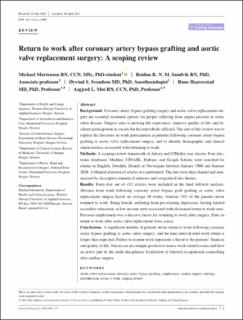Return to work after coronary artery bypass grafting and aortic valve replacement surgery: A scoping review
Mortensen, Michael André Helnes; Sandvik, Reidun Karin Norheim Myhre; Svendsen, Øyvind Sverre; Haaverstad, Rune; Moi, Asgjerd Litlere
Journal article, Peer reviewed
Published version

Åpne
Permanent lenke
https://hdl.handle.net/11250/2766111Utgivelsesdato
2021Metadata
Vis full innførselSamlinger
- Department of Clinical Science [2318]
- Registrations from Cristin [9791]
Sammendrag
Background
Coronary artery bypass grafting surgery and aortic valve replacement surgery are essential treatment options for people suffering from angina pectoris or aortic valve disease. Surgery aims to prolong life expectancy, improve quality of life, and facilitate participation in society for the individuals afflicted. The aim of this review was to explore the literature on work participation in patients following coronary artery bypass grafting or aortic valve replacement surgery, and to identify demographic and clinical characteristics associated with returning to work.
Methods
A scoping review framework of Arksey and O'Malley was chosen. Four electronic databases: Medline, CINAHL, Embase, and Google Scholar were searched for studies in English, Swedish, Danish or Norwegian between January 1988 and January 2020. A blinded selection of articles was performed. The data were then charted and summarized by descriptive numerical analyses and categorized into themes.
Results
Forty-five out of 432 articles were included in the final full-text analysis. Absence from work following coronary artery bypass graft grafting or aortic valve replacement surgery lasted on average 30 weeks, whereas 34% of the patients never returned to work. Being female, suffering from pre-existing depression, having limited secondary education, or low income were associated with decreased return to work rates. Previous employment was a decisive factor for returning to work after surgery. Data on return to work after aortic valve replacement were scarce.
Conclusions
A significant number of patients never return to work following coronary artery bypass grafting or aortic valve surgery, and the time interval until work return is longer than expected. Failure to resume work represents a threat to the patients’ finances and quality of life. Nurses are in a unique position to assess work-related issues and have an active part in the multi-disciplinary facilitation of tailored occupational counselling after cardiac surgery.
